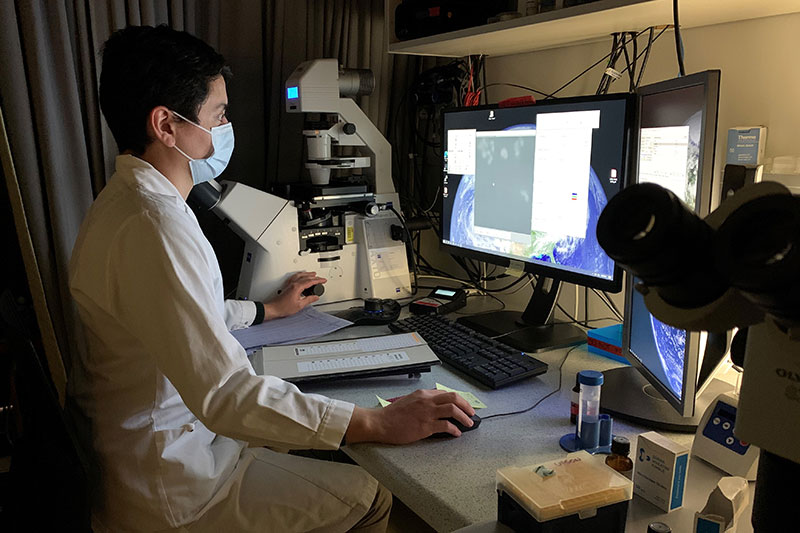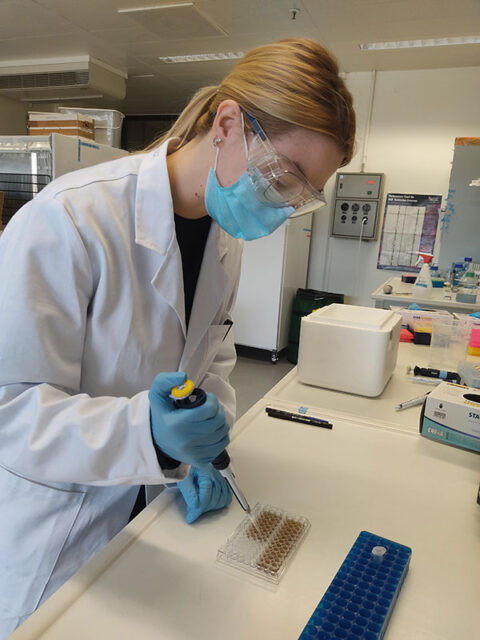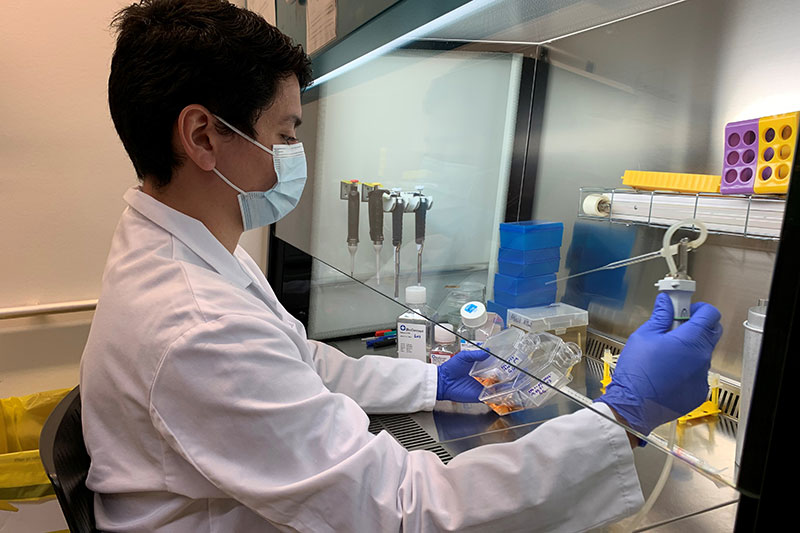Campus education moved to distance learning methods in a matter of days in March 2021. Since then, the challenges have been many, affecting students in all aspects of their life including academic, professional or private matters. The NCCR Chemical Biology master programme gathers students from all over the world, spread between two campuses in Switzerland (Geneva and Lausanne). The pandemic affected them at different stages of their master whether in their first semester or right in their one-year internship in a lab. We wondered what challenges they faced, how they coped with the online teaching or the disruption of their lab work or social life, what is the present situation and what are the lessons learned. Putting into perspective their experience reveals a great capacity of resilience, a quest for efficiency and overall a positive attitude which is wonderful. Discover their story of learning after a year of corona!
New work habits in the lab
The COVID-19 pandemic changed Luis H.R.’s routine completely, both in the personal and academic fields. From being able to work on experiments for his master project in the laboratory every day to working 100% at home to then switching his experimental work in the Gönczy lab (EPFL) to an afternoon-evening shift impacted his sleep schedule and changed the dynamics of his daily routine multiple times. « In order to keep working on my project, I have had to adapt to different working, studying and learning styles in record time ».
« The pandemic is shaping not only the way we do things but also training our adaptability to imminent changes. »
Currently, due to the strict measures that are in place, Luis R.H., like many other students, has to work packing all his experiments as much as possible to perform them as rapidly as possible in order to reduce presence in the laboratory. In the same way, he had to pack the data analysis, writing, and all kind of home office work together. « Not necessarily a bad experience but definitely a different and unexpected way to do things. Without question, this context is setting a new way of doing things, and as everything that you do for the first time, you are never 100% sure of what the outcome will be. Sometimes, we can only do our best working with what we have and hope for the best result. »
During the pandemic, Mahdi A. also managed to adapt his work plan accordingly. The safety measures limited his physical presence on the EPFL campus and in the Heinis lab. It required him to seek for maximizing his efficiency through running different experiments in parallel and planning ahead thoughtfully with imposing control checklists. « These actions speeded up my research progress and boosted the quality and the reproducibility of my results. »
Adaptation of the curriculum from the institution side was another key factor that helped the students cope as best as possible with the challenges. Kerstin H. describes her experience: « During the first lockdown, the laboratories of the University of Geneva were closed. Though lab meetings continued during this time and I was able to continue reading and writing from home, this caused a delay in my lab work. To compensate for this delay, the NCCR Chemical Biology offered an extension of our internships beyond the planned two semesters. The NCCR organized and coordinated extensions in a very individual and flexible manner, considering not only our scientific progress, but also everybody’s preference and personal constraints. This was a great relief in these difficult times. I will be able to finish all the work I had planned to do in the lab without extra stress. »
Factors for effective studying during the pandemic
Asking what they found helpful under the pandemic context, four main points were highlighted by the Master students in Chemical Biology.
Riyaz Kh. first mentioned the need of a proper and reliable Internet connection. « It might seem trivial at first glance, however, given the current context and the classes (or any other university related) work being conducted virtually for majority of the semester, this makes it a priority for me. »
The second point is a robust social support system. Riyaz identified it « in the form of my batchmates, seniors and the NCCR Chemical Biology admin team who extended a helping hand to me more times that I can count and made life less overwhelming, especially for a foreign student. »
« A robust support system made life less overwhelming. »
A third point came up with Milica M. who values the effort made by teachers to be interactive despite the online teaching and the effort of the University of Geneva to maintain in person attendance possibilities as long as it was safe: « The organization of the Master programme was very well adapted to the pandemic learning requirements. The zoom lectures were quite interactive with most of the students keeping their cameras on, which lead to a better sense of involvement and connection between the students. I really appreciated the fact that most of the lab rotations were still in person, which definitely helped in having the exposure to different lab environments, project topics and day to day life in the lab. I also liked the fact that UNIGE was insisting on in-person teaching as long as it was safe because I believe that it is still the best way of learning. »
Finally, Jelena G. values a lot her supervisors’ support. « We are able to work normally, full time, every day. My supervisors are also present in the laboratories and really eager to teach me, so I don’t struggle with the scientific support. » She estimates the pandemic not to have a lot of impact on her and she also benefited of the extension of her internship.
An opportunity to discover new ways of learning
Argyrios K. and Jelena G. are also thankful to their teachers for their creativity, high quality lectures, even Q&A sessions, consultations, practice materials, etc. « It wasn’t difficult to follow up », says Jelena.
Argyrios further explains how he rediscovered the teaching motto: «The best way to learn something is to teach it to someone else”. Zoom breakout rooms worked for him quite well and in some cases better than in person conversations, e.g. searching information on-line could happen without time-loss, making it more efficient. « Working in breakout rooms in Zoom, discussing on a topic/task with people of different backgrounds, puts you in both teacher and student position at the same time, while explaining and trying to understand a concept that is off your training background ».
Another, very useful way of interacting, thus learning, with his colleagues, was when presentations were to be prepared, and they asynchronously edited presentation slides through online tools (e.g. Google Slides) giving the opportunity to work in their own time without the need for arranging a meeting.
Their main struggle: having a limited social life
No surprise. The impossibility to meet new people since the pandemic started is one of the struggles that we all have to face now, worldwide. Jelena G. comments: « No need to say that social interactions and quality of life decreased drastically for all of us, including the inability to meet your friends, have a dinner together, even a lunch at the university, to travel, do sports, go skiing, to visit your family or to have them here in beautiful Geneva. »
Being part of the NCCR Chemical Biology
The NCCR Chemical Biology has moved many of its activities online. This hopefully has allowed the whole NCCR community, including the students of the master programme, to stay alive and active.
Luis H.R. is almost at the end of his master studies and despite the changes brought by the pandemic, he has the feeling of being part of the NCCR Chemical Biology and of the university, probably because he has had a “hybrid” experience during his master. « I started my programme before the start of the pandemic, so I could meet in person not only the rest of the master students and develop strong friendships, but I could also meet in person the NCCR Chemical Biology committee and professors, so it is easier to keep in touch and continue networking within the new online modalities. However, I can empathize with the new NCCR students who might not have been able to experience the beginning of the master program in person, and who had to adapt to an almost exclusively online way for studying and attending events. »
Pranitha K.D. is on the contrary a student who started her master under the pandemic. « I definitely feel like I am a part of the NCCR Chemical Biology community, despite meeting only virtually for most of the semester. I think it is in part due to all the guest lectures and the lab internships which provided a great opportunity for interaction with a lot of PhD students and postdocs working within the NCCR Chemical Biology. Of course, classes with approachable professors for clarification of doubts or just for a general discussion on the subject helped too ».
More info about the Master programme in Chemical Biology (UNIGE & EPFL)




Leave a comment
The editors reserve the right not to publish comments or to abridge them.